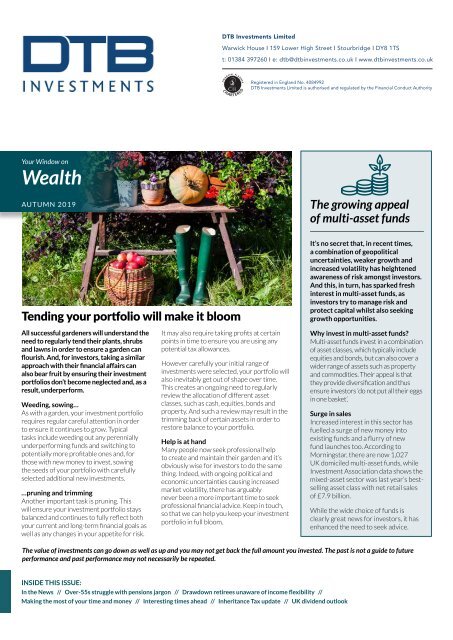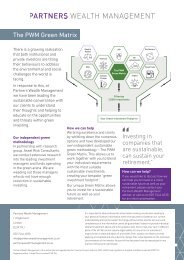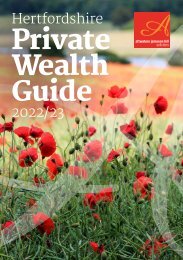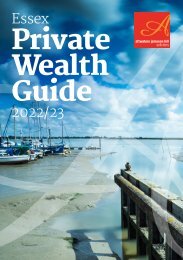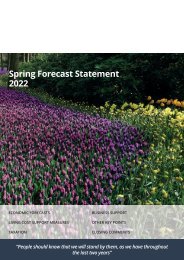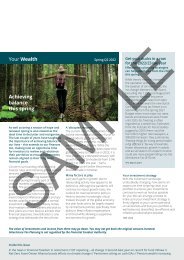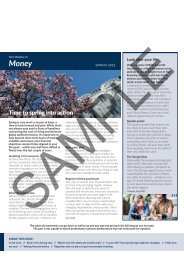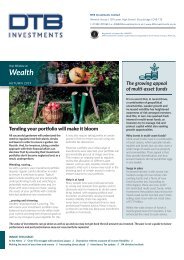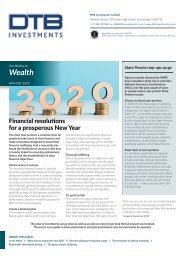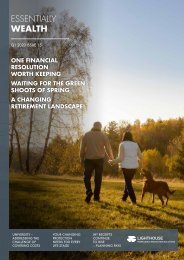DTB Investments - Autumn Wealth newsletter
You also want an ePaper? Increase the reach of your titles
YUMPU automatically turns print PDFs into web optimized ePapers that Google loves.
<strong>DTB</strong> <strong>Investments</strong> Limited<br />
Warwick House I 159 Lower High Street I Stourbridge I DY8 1TS<br />
t: 01384 397260 I e: dtb@dtbinvestments.co.uk I www.dtbinvestments.co.uk<br />
Registered in England No. 4084992<br />
<strong>DTB</strong> <strong>Investments</strong> Limited is authorised and regulated by the Financial Conduct Authority<br />
Your Window on<br />
<strong>Wealth</strong><br />
AUTUMN 2019<br />
The growing appeal<br />
of multi-asset funds<br />
Tending your portfolio will make it bloom<br />
It’s no secret that, in recent times,<br />
a combination of geopolitical<br />
uncertainties, weaker growth and<br />
increased volatility has heightened<br />
awareness of risk amongst investors.<br />
And this, in turn, has sparked fresh<br />
interest in multi-asset funds, as<br />
investors try to manage risk and<br />
protect capital whilst also seeking<br />
growth opportunities.<br />
All successful gardeners will understand the<br />
need to regularly tend their plants, shrubs<br />
and lawns in order to ensure a garden can<br />
flourish. And, for investors, taking a similar<br />
approach with their financial affairs can<br />
also bear fruit by ensuring their investment<br />
portfolios don’t become neglected and, as a<br />
result, underperform.<br />
Weeding, sowing…<br />
As with a garden, your investment portfolio<br />
requires regular careful attention in order<br />
to ensure it continues to grow. Typical<br />
tasks include weeding out any perennially<br />
underperforming funds and switching to<br />
potentially more profitable ones and, for<br />
those with new money to invest, sowing<br />
the seeds of your portfolio with carefully<br />
selected additional new investments.<br />
…pruning and trimming<br />
Another important task is pruning. This<br />
will ensure your investment portfolio stays<br />
balanced and continues to fully reflect both<br />
your current and long-term financial goals as<br />
well as any changes in your appetite for risk.<br />
It may also require taking profits at certain<br />
points in time to ensure you are using any<br />
potential tax allowances.<br />
However carefully your initial range of<br />
investments were selected, your portfolio will<br />
also inevitably get out of shape over time.<br />
This creates an ongoing need to regularly<br />
review the allocation of different asset<br />
classes, such as cash, equities, bonds and<br />
property. And such a review may result in the<br />
trimming back of certain assets in order to<br />
restore balance to your portfolio.<br />
Help is at hand<br />
Many people now seek professional help<br />
to create and maintain their garden and it’s<br />
obviously wise for investors to do the same<br />
thing. Indeed, with ongoing political and<br />
economic uncertainties causing increased<br />
market volatility, there has arguably<br />
never been a more important time to seek<br />
professional financial advice. Keep in touch,<br />
so that we can help you keep your investment<br />
portfolio in full bloom.<br />
Why invest in multi-asset funds?<br />
Multi-asset funds invest in a combination<br />
of asset classes, which typically include<br />
equities and bonds, but can also cover a<br />
wider range of assets such as property<br />
and commodities. Their appeal is that<br />
they provide diversification and thus<br />
ensure investors ‘do not put all their eggs<br />
in one basket’.<br />
Surge in sales<br />
Increased interest in this sector has<br />
fuelled a surge of new money into<br />
existing funds and a flurry of new<br />
fund launches too. According to<br />
Morningstar, there are now 1,027<br />
UK domiciled multi-asset funds, while<br />
Investment Association data shows the<br />
mixed-asset sector was last year’s bestselling<br />
asset class with net retail sales<br />
of £7.9 billion.<br />
While the wide choice of funds is<br />
clearly great news for investors, it has<br />
enhanced the need to seek advice.<br />
The value of investments can go down as well as up and you may not get back the full amount you invested. The past is not a guide to future<br />
performance and past performance may not necessarily be repeated.<br />
INSIDE THIS ISSUE:<br />
In the News // Over-55s struggle with pensions jargon // Drawdown retirees unaware of income flexibility //<br />
Making the most of your time and money // Interesting times ahead // Inheritance Tax update // UK dividend outlook
Your Window on <strong>Wealth</strong><br />
In the<br />
NEWS<br />
FCA TO TACKLE WEB FRAUD<br />
The Financial Conduct Authority<br />
(FCA) has established a ‘war room’ to<br />
tackle suspect investment schemes<br />
advertised online. This follows a wave<br />
of internet scams, often targeting<br />
vulnerable pensioners. The team aims<br />
to curtail the increasing number of<br />
internet-enabled fraudulent schemes,<br />
often operated by small groups<br />
of criminals, which are defrauding<br />
consumers out of hundreds of<br />
millions of pounds.<br />
Over-55s struggle with pensions jargon<br />
NS&I ATTRACTING YOUNGSTERS<br />
National Savings & <strong>Investments</strong><br />
(NS&I) has seen a sharp rise in new<br />
customers under the age of 16. This<br />
increase is partly attributed to a<br />
raft of Premium Bond rule changes,<br />
including lowering the minimum<br />
investment from £100 to £25. And<br />
further rises are expected later this<br />
year when, for the first time, any adult<br />
will be able to buy Premium Bonds for<br />
any child.<br />
HMRC ‘CLUELESS’<br />
A Freedom of Information response<br />
obtained by Royal London 1 has<br />
revealed that HMRC ‘hasn’t got a<br />
clue’ how many fines have been<br />
issued for breaches to pension tax<br />
relief rules. The rules are complex<br />
and Royal London is arguing that, if<br />
large numbers of people are being<br />
fined, the industry needs to know so<br />
customers can be alerted to the issue.<br />
1<br />
Royal London, July 2019<br />
A recent study 2 has found that a<br />
significant proportion of over-55s<br />
struggle to understand a range of key<br />
terms and rules relating to pensions. The<br />
survey asked 2,002 UK adults to identify<br />
and define various pension-related terms<br />
and acronyms.<br />
Baffled…<br />
Findings from the survey highlighted a<br />
serious lack of pensions knowledge, even<br />
amongst those people who have already<br />
reached an age where they can access any<br />
defined contribution personal pensions<br />
savings they have accumulated. With only<br />
one in five baby boomers (aged 55 to 75)<br />
able to correctly identify the definition of<br />
the Lifetime Allowance and almost two<br />
in three incorrectly defining the Annual<br />
Allowance, it is clear that many people are<br />
struggling to understand the terminology<br />
relating to their pensions.<br />
…and confused<br />
In addition, very few respondents were able<br />
to correctly identify key pension acronyms.<br />
For example, only 4.5% recognised TVAs<br />
(transfer value analysis) and just 1%<br />
identified TVCs (transfer value comparator)<br />
as pensions acronyms. Adding to the<br />
confusion, around 4% of respondents in<br />
each case thought that the texting acronym<br />
LOL, the television shopping channel QVC<br />
and the footballing term ‘offside’ were all<br />
pension-related terms.<br />
Cutting through the jargon<br />
If you are one of the baffled and confused,<br />
then don’t panic, you’re certainly not<br />
alone! We know that many people view<br />
pensions as complex products and are<br />
often bemused by the complicated array<br />
of acronyms and jargon pension providers<br />
use. Funding your retirement and feeling<br />
confident that you understand your<br />
pension products is vitally important. So,<br />
we’re here to help. We’ll cut through the<br />
jargon, explain everything in plain English<br />
and help guide you through the pensions<br />
maze using language you’ll understand.<br />
2<br />
Portafina, June 2019<br />
2
<strong>Autumn</strong> 2019<br />
Drawdown retirees<br />
unaware of income<br />
flexibility<br />
A YouGov survey commissioned by<br />
Zurich 3 has revealed that most retirees<br />
in drawdown are unaware they can<br />
vary their level of income. And, perhaps<br />
unsurprisingly, the research also found<br />
those not receiving financial advice were<br />
more likely to be in the dark.<br />
Importance of advice<br />
The study suggests over half of individuals<br />
who have unlocked their savings since the<br />
introduction of pension freedoms in 2015<br />
were unaware they could scale back or<br />
stop withdrawals from their pension funds<br />
despite flexible income being a key feature<br />
of drawdown.<br />
A stark difference was also revealed in the<br />
knowledge of those who had sought advice<br />
and those who hadn’t. Indeed, while only<br />
35% of non-advised retirees knew they<br />
could reduce drawdown income, 77% of<br />
respondents receiving ongoing advice were<br />
aware of this fact.<br />
‘Pound-cost-ravaging’ trap<br />
There is a danger to this ignorance as it<br />
puts investors unwittingly at risk of draining<br />
their pension pots if stock markets fall. This<br />
is known as ‘pound-cost-ravaging’ (not to<br />
be confused with ‘pound cost averaging’)<br />
and is where people are forced to sell more<br />
investments to achieve unsustainable income<br />
levels. Engaging with your drawdown savings<br />
is vitally important; we’re here to help you<br />
plan effectively.<br />
3<br />
Zurich, June 2019<br />
...over half of individuals who have<br />
unlocked their savings since the<br />
introduction of pension freedoms in<br />
2015 were unaware they could scale<br />
back or stop withdrawals from their<br />
pension funds...<br />
Making the<br />
most of your time<br />
and money<br />
Analysis of HMRC data 4 has<br />
highlighted the fact that a majority<br />
of pensioners are continuing to<br />
save for their future. The latest<br />
HMRC statistics reveal that the<br />
average value of an ISA held by<br />
someone aged over 65 now stands<br />
at £47,000, an increase of £4,500<br />
on the previous year.<br />
A cautious approach<br />
The data indicates that many<br />
pensioners may be putting aside<br />
money to cover unforeseen costs,<br />
such as a broken boiler and to buy<br />
more expensive one-off items rather<br />
than relying on their day-to-day<br />
income to pay for such things.<br />
It seems other over-65s are<br />
continuing to save through fear of<br />
running out of money and whilst<br />
this may be a good idea in many<br />
cases, some over-65s could be living<br />
unnecessarily frugal lives as a result<br />
of this fear.<br />
Finding the right balance<br />
It is always a fine balancing act<br />
ensuring you plan for your future<br />
without forgetting to live in the<br />
present. Seeking sound financial<br />
advice can help to ensure you<br />
achieve the right balance.<br />
4<br />
Just Group, May 2019<br />
3
Your Window on <strong>Wealth</strong> | <strong>Autumn</strong> 2019<br />
Interesting<br />
times<br />
ahead<br />
Recent data shows the global economy<br />
faltered in the second quarter of 2019.<br />
Policymakers have begun to respond,<br />
with the US Federal Reserve (Fed) cutting<br />
rates for the first time in a decade, but with<br />
the US-China trade dispute rumbling on and<br />
another Brexit deadline looming, fears of a<br />
global recession have increased.<br />
The Office of Tax Simplification (OTS)<br />
has published a second report in relation<br />
to its Inheritance Tax (IHT) review. The<br />
report, published in July, spans 103 pages<br />
and is entitled ‘Simplifying the design of<br />
Inheritance Tax’.<br />
Recommendations<br />
The report explores the main complexities<br />
and technical issues associated with IHT,<br />
making 11 recommendations which the<br />
OTS believes would make the tax easier<br />
to understand. Four of these relate<br />
specifically to lifetime gifts and aim to<br />
streamline gift exemptions and change the<br />
way the tax works in this area to make it<br />
simpler and more intuitive.<br />
Other recommendations consider IHT<br />
in relation to businesses and farms,<br />
INHERITANCE TAX UPDATE<br />
addressing distortions in the operation<br />
and scope of reliefs such as those for<br />
business property and agricultural<br />
property. A further recommendation<br />
focuses on the interaction between<br />
IHT and Capital Gains Tax.<br />
An unpopular tax<br />
The OTS has acknowledged that IHT<br />
remains unpopular and raises strong<br />
emotions amongst the public. The Treasury,<br />
who commissioned the report, said it will<br />
respond to the recommendations in due<br />
course. We’ll keep you updated on any<br />
further developments.<br />
The Financial Conduct Authority does not<br />
regulate some forms of taxation advice.<br />
Economic growth<br />
Second-quarter gross domestic product (GDP)<br />
statistics have revealed a significant weakening<br />
in growth across most major economies. In the<br />
US, for example, GDP rose at an annualised<br />
rate of 2.1%, significantly below the 3.1%<br />
recorded in the first quarter, while China’s<br />
annualised growth rate of 6.2% was the<br />
country’s weakest since records began in 1992.<br />
Fed reduces rates<br />
With fears of a potential downturn growing,<br />
the Fed cut its key benchmark interest rate<br />
by a quarter of a percentage point on 31 July,<br />
the first reduction in US borrowing costs<br />
since 2008. It also signalled a readiness to<br />
provide further support if the economic<br />
outlook deteriorated further.<br />
Recessionary fears<br />
Global growth momentum has clearly<br />
waned in recent months and the balance<br />
of risks to the world economy appear skewed<br />
to the downside. The US-China trade war<br />
continues to cast a shadow over growth<br />
prospects, while the increased likelihood of a<br />
disorderly Brexit is also causing consternation.<br />
It is important to take professional advice<br />
before making any decision relating to<br />
your personal finances. Information within<br />
this <strong>newsletter</strong> is based on our current<br />
understanding of taxation and can be<br />
subject to change in future. It does not<br />
provide individual tailored investment<br />
advice and is for guidance only. Some rules<br />
may vary in different parts of the UK;<br />
please ask for details. We cannot assume<br />
legal liability for any errors or omissions<br />
it might contain. Levels and bases of, and<br />
reliefs from, taxation are those currently<br />
applying or proposed and are subject<br />
to change; their value depends on the<br />
individual circumstances of the investor.<br />
The value of investments can go down<br />
4<br />
as well as up and you may not get back<br />
the full amount you invested. The past<br />
Focus on what really matters<br />
Many investors are getting used to a variety<br />
of political, financial and economic factors and<br />
learning to look through the ‘noise’ to focus on<br />
what really matters. Portfolio diversity holds<br />
the key to approaching your investments<br />
and managing risk. Having different assets<br />
in your portfolio from different sectors and<br />
global regions is helpful in achieving this.<br />
It is important to think about longer-term<br />
timescales instead of focusing too intently on<br />
short-term events and market fluctuations.<br />
What is clear is that financial advice is<br />
essential to help position your portfolio in<br />
line with your objectives and attitude to<br />
risk. Remember to get in touch if you have<br />
any changes in your personal circumstances<br />
which may affect your objectives, risk and<br />
capacity for loss.<br />
The value of investments can go down as<br />
well as up and you may not get back the full<br />
amount you invested. The past is not a guide<br />
to future performance and past performance<br />
may not necessarily be repeated.<br />
is not a guide to future performance and<br />
past performance may not necessarily<br />
be repeated. If you withdraw from an<br />
investment in the early years, you may<br />
not get back the full amount you invested.<br />
Changes in the rates of exchange may<br />
have an adverse effect on the value<br />
or price of an investment in sterling<br />
terms if it is denominated in a foreign<br />
currency. Taxation depends on individual<br />
circumstances as well as tax law and<br />
HMRC practice which can change.<br />
The information contained within this<br />
<strong>newsletter</strong> is for information only purposes<br />
and does not constitute financial advice.<br />
The purpose of this <strong>newsletter</strong> is to provide<br />
technical and general guidance and<br />
should not be interpreted as a personal<br />
recommendation or advice.<br />
UK DIVIDEND OUTLOOK<br />
Although the overall level of<br />
dividend payments recently rose to<br />
another all-time high, the outlook is<br />
less favourable, and it may be time to<br />
temper expectations.<br />
Underlying weakness<br />
According to data 5 , total dividends<br />
paid by UK listed firms rose to £37.8<br />
billion in the second quarter of 2019,<br />
a rise of 14.5%. This can be attributed<br />
to the continued Brexit-related<br />
weakness in sterling and buoyant<br />
special dividends. The exchange-rate<br />
effect accounts for half the underlying<br />
growth rate. UK dividends benefit<br />
from the weaker pound because<br />
multinationals earn the majority of<br />
their profits overseas.<br />
The data also revealed a distinct<br />
weakening in the underlying growth<br />
of UK company payouts. And this<br />
weakness implies a more cautious<br />
outlook for future dividend payments.<br />
5<br />
Link Asset Services, July 2019<br />
IF YOU WOULD<br />
LIKE ADVICE OR<br />
INFORMATION<br />
ON ANY OF THE<br />
AREAS HIGHLIGHTED<br />
IN THIS NEWSLETTER,<br />
PLEASE GET IN TOUCH.<br />
AUTUMN 2019 E&W


